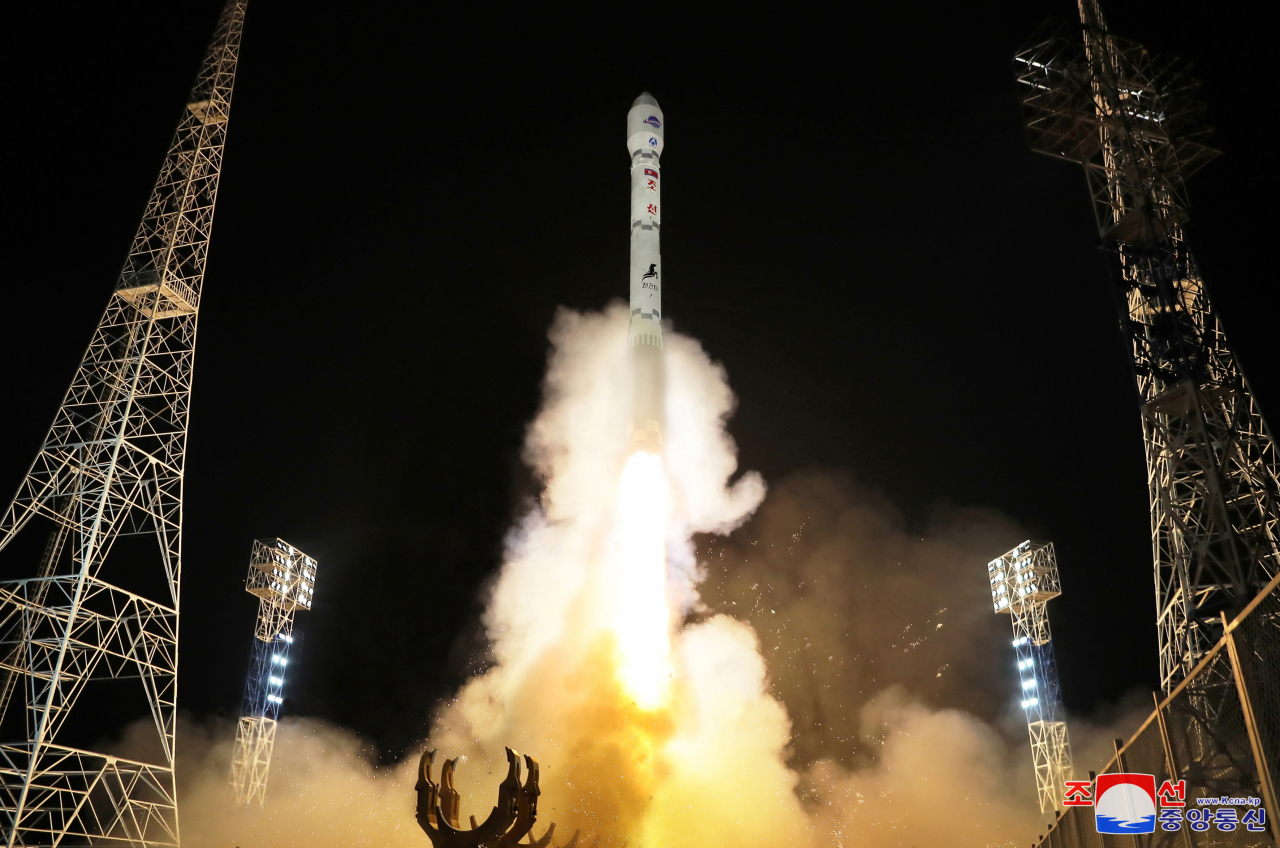 |
A new type of the Chollima-1 rocket carrying a reconnaissance satellite called the Malligyong-1 lifts off from the launching pad at the Sohae satellite launch site in Tongchang-ri in northwestern North Korea at 10:42 p.m. on Nov. 21, in this photo released the next day by the state-run Korean Central News Agency. (Yonhap) |
In an unprecedented move, South Korea, the United States, Australia and Japan collectively and consecutively declared the imposition of unilateral sanctions on North Korea on Thursday and Friday.
The united front is a direct response to North Korea's launch of a purported "military reconnaissance satellite" on Nov. 21, highlighting the coordinated efforts of like-minded countries in the face of a notable absence of actions at the United Nations Security Council.
South Korea has imposed sanctions on 11 North Korean individuals involved in satellite development, procurement of related materials, as well as ballistic missile research, development and operation, South Korea’s Foreign Ministry said Friday.
Excluding Jin Su-nam, the remaining 10 individuals marked represent the first-ever designations made by South Korea on a global scale.
Ri Chul-ju, Kim In-bum, Ko Kwan-yong and Choi Myong-su from the state-run National Aerospace Technology Administration, which is responsible for the Nov. 21 launch, along with Kang Son, a manager from the Ryongsong Machine Complex, have been identified for their involvement in satellite development and procurement of supplies.
South Korea's Foreign Ministry underscored the significance of the sanctions consecutively and concurrently imposed by the governments of South Korea, the United States, Australia and Japan in response to North Korea's launch of the alleged military spy satellite.
While instances of coordinated announcements of unilateral sanctions by the trilateral partnership of South Korea, the US, and Japan occurred in December of last year and this September, the inclusion of Australia marks the first occurrence of such collaboration.
"Australia's first-ever participation in the established framework of consecutively imposed sanctions by South Korea, the US, and Japan demonstrates the international community's strengthened commitment not to overlook North Korea's recurrent provocations," the Foreign Ministry said in a statement.
The US was the one who took the first step in the first-ever quadruple coordinated imposition of sanctions on North Korea.
The US Treasury Department on Thursday announced unilateral sanctions on eight foreign-based North Korean agents involved in facilitating sanctions evasion such as revenue generation, and procurement of missile-related technology that contribute to North Korea’s weapons of mass destruction, or WMD, programs.
In a parallel move, the Treasury Department also has sanctioned the cyber espionage group Kimsuky for gathering intelligence in support of North Korea’s strategic objectives.
"Today's actions by the United States, Australia, Japan and the Republic of Korea reflect our collective commitment to contesting Pyongyang’s illicit and destabilizing activities," the Treasury’s Under Secretary for Terrorism and Financial Intelligence Brian Nelson said, referring to South Korea by its official name.
Tokyo has unilaterally imposed sanctions on four entities and five individuals in response to North Korea’s launch of a spy satellite, Japan's Foreign Ministry announced Friday.
Australia has also levied targeted financial sanctions on seven individuals and one entity associated with North Korea's weapons of mass destruction, missile programs, and the Nov. 21 satellite launch, its Foreign Ministry said Friday.
"Australia condemns North Korea's satellite launch on 21 November, which was a reckless act that seriously undermined security and stability in our region," Australian Foreign Affairs Minister Penny Wong said in a statement.
"Australia is working with our allies and partners to slow the development of North Korea's destabilizing weapons programs and increase pressure on its procurement and revenue generation networks."
The collective action followed an emergency meeting at the UNSC on Monday, convened to address North Korea’s Nov. 21 launch, which concluded without any outcome.
The launch was a clear violation of the UNSC’s resolutions prohibiting North Korea from using ballistic missile technology.
Nevertheless, China and Russia, both wielding vetoes as permanent members of the UNSC, have consistently opposed any actions against North Korea's launches, despite their clear violations of multiple UNSC resolutions.
This year alone, North Korea has conducted 29 ballistic missile launches, including four intercontinental ballistic missiles, and launched three space vehicles utilizing ballistic missile technology.







![[Today’s K-pop] Blackpink’s Jennie, Lisa invited to Coachella as solo acts](http://res.heraldm.com/phpwas/restmb_idxmake.php?idx=644&simg=/content/image/2024/11/21/20241121050099_0.jpg)